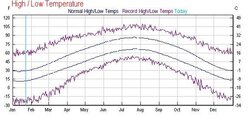Howdy all,
Getting ready to built a roughly 750 sq. ft. house this spring with full basement. Both basement and main level will be insulated to at least r-20 and probably r-60 in the attic. The basement will just be a work shop now but could be finished off in the future. It should be a very easy house to heat and I plan on heating 100% with wood, which I've been doing already the past few years.
What I need to decide on though is a backup heat source for when I leave for a couple days or more in the winter to keep the pipes from freezing. Either electric or propane are options. I'm hoping I can get by without any duct work and just let the heat from the basement radiate up through the floor to keep the main level above freezing. Sound plausible?
Propane would be more efficient but would require plumbing fresh air and exhaust. For the little use the heater will see I wonder if the better efficiency of propane is worth it?
I'm pretty unfamiliar with what's available out there besides your run of the mill forced air furnaces and electric baseboard heaters. What are some of you using and what would you recommend I look into? I'm in northern Iowa and our winters get pretty cold so a heat pump is out. I'll probably get some sort of air exchanger for the house so something that could take care of that as well without having to run the furnace would be a bonus.
Thanks,
Alan
Getting ready to built a roughly 750 sq. ft. house this spring with full basement. Both basement and main level will be insulated to at least r-20 and probably r-60 in the attic. The basement will just be a work shop now but could be finished off in the future. It should be a very easy house to heat and I plan on heating 100% with wood, which I've been doing already the past few years.
What I need to decide on though is a backup heat source for when I leave for a couple days or more in the winter to keep the pipes from freezing. Either electric or propane are options. I'm hoping I can get by without any duct work and just let the heat from the basement radiate up through the floor to keep the main level above freezing. Sound plausible?
Propane would be more efficient but would require plumbing fresh air and exhaust. For the little use the heater will see I wonder if the better efficiency of propane is worth it?
I'm pretty unfamiliar with what's available out there besides your run of the mill forced air furnaces and electric baseboard heaters. What are some of you using and what would you recommend I look into? I'm in northern Iowa and our winters get pretty cold so a heat pump is out. I'll probably get some sort of air exchanger for the house so something that could take care of that as well without having to run the furnace would be a bonus.
Thanks,
Alan



